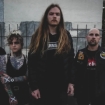Courtney Laplante's nightmare would be screaming one of Spiritbox's alt-metal songs in front of judge Simon Cowell and the crowd of normies at America's Got Talent. And yet last summer, Cowell, along with millions of viewers across America, was dramatically introduced to the intense sounds of Spiritbox — as LaPlante tuned in and cheered.
So how — in the infancy of their career, and after only one album — did this Canadian band from a small island in Victoria, British Columbia, manage to enter the small pantheon of metal acts who have had their mainstream crossover moment? And why was LaPlante so happy about it? It all began with a young girl's scream.

It was a Saturday in June 2022, the day America's Got Talent was due to air, and the day the world would witness the young screamer in question — 10-year-old Harper Jerret from Somerset, England — assault Cowell and the judges with her performance of Spiritbox's breakout hit "Holy Roller."
Everything appeared to align, like it was fated. LaPlante had previously befriended Jerret after discovering her on Instagram, and — on the exact night of the broadcast — Jerret found herself joining Spiritbox at their sold-out show in London to perform the very same banger from her AGT audition. As Jerret walked onstage, LaPlante imagined herself at that age: a timid child, years from realizing her identity as an artist, almost a decade out from finding her scream. "At her age I was just like, 'I love horses so much, they're so sick' and 'I wish Space Jam was real'," says the singer in her typically self-deprecating manner. (LaPlante is also prone to laughing at herself, which she does frequently, and infectiously, throughout our Zoom call.) "But I think she's a kid who's a bit ahead of the other kids, emotionally, because she's able to ask herself: Who am I? I am an artist."
LaPlante was immediately protective of that nascent determination. "Don't go near the front of the stage," she recalls telling Jerret, desperate to keep her safe — to make sure she wouldn't stray, to make sure she wouldn't fall. The duet came off without a hitch, but LaPlante was still a little apprehensive that night. She knew that within hours Jerret's America's Got Talent audition would air — to an audience that she suspected numbered in the metal-hating millions. LaPlante, quite sensibly, didn't trust Simon Cowell. She didn't trust the normies. She was expecting the worst.
Alongside her husband and bandmate Mike Stringer, LaPlante headed to her hotel room. They braced themselves for the audition and were pre-pared to talk shit about the judges. "We were ready to defend … like, 'Fuck you, Simon Cowell!'" she says. "Because we only have our own experience with normal culture and how they interact with what we do." Instead, as Jerret's performance unfolded, LaPlante watched with amazement as the judges' initial, terrified awe relaxed into total admiration.
"Holy roller sits in the garden we fled/Blood into wine, take my body instead," Jerret enunciated like a tiny Shakespearean thespian, before launching into a LaPlante-worthy scream that was all animal, that obliterated all boundaries of primetime decorum. A standing ovation. A thumbs up from Simon Cowell. Three yeses. LaPlante cheered for Jerret — and then sat up and took note. This is what happens when you don't take away a little girl's freedom to scream. This is what happens when you imagine the world as a stage from which to shout unashamed.

"It was amazing to see that girls can make this kind of music," Jerret recently told Revolver of first discovering LaPlante's performance on "Holy Roller," which her stepfather had introduced her to around the time Spiritbox released their 2021 full-length debut, Eternal Blue. "I was really inspired by Courtney to start screaming and making my own music." The song was Jerret's introduction to metal, her gateway into the genre. "Holy Roller" has now become, for an increasing number of kids across the world, their gateway, too.
It was a surreal moment that garlanded one of the most rapid ascensions in recent metal history. Watchful eyes have been placed on Spiritbox ever since their inception in 2017. But it wasn't until July 2020 — when they released "Holy Roller," the first single from Eternal Blue — that they turned from a niche one-to-watch act to one of metal's most exciting new prospects. They soon secured a No. 1 spot on SiriusXM's Liquid Metal radio station as well as a significant, devoted fanbase — and for good reasons. Spiritbox were expanding the genre in both sound and scope, incorporating djent blasts and industrial breakbeats into hypnagogic dreamscapes while broadening metal's emotional range beyond brazen anguish and rage.
On this point, LaPlante is especially passionate. "I feel like we're one of the only remaining genres that has to be so binary in what the music is about and how the music makes you feel," she says. "Other music has a wide scope: songs about partying, songs about heartbreak, songs about being angry, songs about feeling depressed, songs about feeling happy. [Metal] is a broad genre, but a lot of it feels like it's on autopilot."
If the success of "Holy Roller" wasn't enough of a tell, by the time Eternal Blue dropped in September 2021 it was crystal clear: Spiritbox were on the rise — and steering their own plane. The record debuted at No. 13 on the Billboard 200, marking that year's highest-charting release for the genre at that point. Incessant, relentless touring followed, as they supported many of hard rock's legacy acts and gained swathes of new fans from devotees of Ghost, Underoath, Bring Me the Horizon, even Limp Bizkit. Every metric and data point suggest it: Spiritbox are big. Their influence has both pushed the genre forward and opened it up to a new generation. All at once, everything has changed — and yet everything still remains the same. This is Spiritbox's strange new reality.
When LaPlante logs into our video call, the singer is once again sitting in front of the exact same setup from which I interviewed her for a Revolver "Uprising" profile just over two years ago. A weak-tea-colored wall is behind her, precariously nailed to which is a black-and-purple Spiritbox poster that she and Stringer designed together over five years ago. But some things are different: A few empty moving boxes can be seen in the background — as soon, the band will be splitting their time between Victoria and Los Angeles. It's purely a business decision; the cost of an apartment is cheaper than all the hotel stays they've splurged on while travelling down to California to record. "When I go away from my island, go to L.A., Michael and I get very shocked," she says. "It's absolutely bizarre for us. I think being here has kind of protected us, sheltered us. It's a literal and figurative island for us."

Again: everything is changing and yet everything remains the same. LaPlante and Stringer still work the same data-entry job they were at before Spiritbox took off. Well, sort of. "Work" is putting it generously. Although they are still, technically, employees of the company, LaPlante's forgotten her log-in password, which means she can't make a formal resignation even if she wanted to — and neither of them have worked a shift there in over two years. "It's kind of sick and twisted that I haven't quit. I think it's a weird motivating thing," says LaPlante. "I keep it because I wanna remind myself that I might very easily have to go back to doing something I don't like, and that it's a huge privilege I get to do something I do like."
LaPlante also reveals that she continues to feel further and further away from the person she was before she was "Courtney LaPlante," leader of Spiritbox and full-time professional musician. This, in her mind, is a dangerous state to be in. She is financially secure for the first time in her adult life, but she considers that security a misnomer. She constantly must remind herself of the professional musician's precarious state. "To other artists who have been around longer: Does that secure feeling ever come to you, or does it feel like this forever?" she wonders. "Because I still feel much closer to my office job than to, like, being in Slipknot."
LaPlante speaks at length about the financial reality of being in a band, a reality that has been romanticized, and that she wishes to demystify. She's long been curious about the ways in which audiences fetishize artists and view them as a pure commodity and not as workers like the rest of us. She considers it one of metal's last remaining taboos.
"I'm 33 and I've been gambling my whole life in hopes that this pays off," says the singer, who prior to forming Spiritbox was, along with Stringer, a member of metalcore outfit Iwrestledabearonce. "But I know the reality ... If people knew how non-lucrative this world is and how little money most bands make, they'd probably be more likely to buy an extra shirt. One time I saw a Reddit thread saying, 'Oh my god these people have jobs?! … They have 700,000 monthly listeners.' And I was like, that's not paying anyone's bills."

For the sake of her fans, her dreams, her bank account — LaPlante is focused on making sure that Spiritbox are continually scaling up, thinking bigger. She owes it to herself. For the entirety of her adult life, up until now, LaPlante has been looked at as though she's been in a perpetual state of delusion. "For over 10 years, I've been pursuing this crazy dream," she says. "And whether people supported it or not, they didn't really understand — because it's such a strange thing to want to do. Like, 'Why are you spending all your money recording songs that no one wants to hear?' It's hard to explain to people because it is extremely irrational. When you say it out loud, you're like, Yeah, why am I doing this? Am I insane?"
Turns out the dream wasn't so crazy after all. Courtney LaPlante, certified not insane. The sold-out shows for Spiritbox's upcoming headlining tour, alone, prove that. For the first half of this year — and for the first time ever — Spiritbox won't be playing within the parameters of another band. This is their live show, their production. "We really wanna ramp it up, invest in it, blow everyone's minds. I want everyone to walk away saying, 'I wanna see that band again — and in a bigger place.' That's my dream. Now I'm like, OK, how am I gonna impress these people?"
Performing is LaPlante's stimulant, though it's not without its occasional comedowns. Having played only a little over a hundred shows, she's yet to get into her groove. Every night is a test. "I still have a lot to learn about performing. The whole time I'm thinking, How's Michael doing? Is his guitar sounding good? OK, that light worked. This part worked," she says. "It's weird; it's like that combined with an out-of-body experience. Meanwhile, I'm singing about being depressed. Most of my songs are about me having dark feelings and my struggle with depression and just feeling all the strong feelings I've had throughout my life. It's both extremely emotionally therapeutic and also literally performative at the same time."
If 2022 whipped them into becoming a good band, 2023 will be the year that ensures Spiritbox's enduring greatness. "I'm really excited, but it is gonna be really hard," says LaPlante. "We love to sabotage ourselves. So we're like, Hey, let's throw in writing new music, too — and hopefully we'll get some new music out in the first half of the year. After that we're gonna hibernate and hopefully write an album. That's the goal. Crazy first half of the year, pretty chill second half."

Spiritbox began writing new material in November of last year. "Now we have to figure out when do we show you the songs? Do we show you in March? Do we show you in September? Or do we wait until 2024? I don't know." Sooner sounds more likely than later. LaPlante hates sitting on new music. "We wrote this music because we really wanna share it with you," she says. "It made us feel a certain way and we wanna see if it makes you feel a certain way, too."
Still, the songs keep piling up. LaPlante doesn't reveal much about the new music, not out of preciousness, but simply because she's yet to find the right words to describe it. She mentions repeated phrases and themes throughout the songs: mental prisons, body horror, visual illusions, disillusionment — all material she believes she could fit into a concept album or EP. "To me, all these songs are one big song lyrically and thematically," she says. "If everything aligns and we feel really strongly that everything hits exactly how we want — the art and the music and the whole thing around it — we'll want to put this out as soon as possible. If we do our job right, then we will."
Carrying that young girl's yell of fearlessness with her, LaPlante is pushing both herself and an entire genre forward.
Photographer Assistant: Keanu Pagano; Makeup: Christina Guerra; Hair: Natalie Jean












